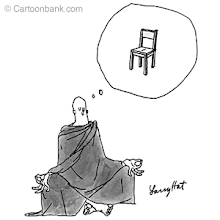"When my guru wanted to compliment me, he called me simple; when he wished to chide me, he called me clever." -Ram Dass
When we complicate our personal philosophy too much it fails to bring us peace.
Having gratitude for the abundance of our life and not focusing on what is missing to complete the "American Dream", is a positive mindset.
Stop attending to the marketing lies that inundate us daily on the radio, on TV, and in magazines; telling us the best car to drive, the best wine to drink, or the greatest vacation spots in the world. The message is clear that we need to get out our credit cards and join the consumer orgy. We are told that this is the path to happiness.
Be a man of few wants and you will relax and pay more attention to things that matter like your family, friends, and your spiritual dimension.
The words of Rabbi Zelig Pliskin are very similar to the message you might hear from the Dalai Lama or Psychologist Martin Seligman.
It is a universal message:
"Happiness is a skill that can be learned. The essential factor whether or not you will live a happy life is based less on external factors such as wealth, success and fame, and more on your attitude toward life, toward yourself, toward other people, and toward events and situations."
Martin Seligman offers ways to move beyond simply seeking good feelings, to pursuing a better life. Focusing solely on the positive emotion of happiness isn't enough.
Seligman argues that happiness is only one of five human motivations.
"We abbreviate it as PERMA.
P is positive emotion,
E is engagement,
R is relationships,
M is meaning and
A is accomplishment.
Those are the five elements of what free people chose to do. Pretty much everything else is in service of one of or more of these goals."
"We're trying to do something liberating by saying even if you [are depressed], you don't get consigned to the hell of unhappiness. You can have meaning, accomplishment, engagement and good relationships, even if you are dull on the positive affect side."
Lesson 1. First Splendid Truth: To be happy, you need to consider feeling good, feeling bad, and feeling right, in an atmosphere of growth.
These are the elements of happiness.
If you want to boost your happiness, try tackling one element.
Get more “feeling good,” say. Or eliminate a source of “feeling bad.”
Think about whether you “feel right” about the shape of your life. And look for an area in your life where you can create “an atmosphere of growth.”
Lesson 2. Second Splendid Truth: One of the best ways to make yourself happy is to make other people happy; One of the best ways to make other people happy is to be happy yourself.
People often focus on the first half of this statement, but the second half is just as important. It turns out, studies show, that happy people are more altruistic, more likely to volunteer, more interested in other people’s problems, and they are also better leaders and better able to bring about changes, when they try to do so.
Lesson 3. Third Splendid Truth: The days are long, but the years are short.
Lesson 4. Fourth Splendid Truth: You’re not happy unless you think you’re happy.
Lesson 5. Your body matters.
It sounds obvious, but it’s easy to overlook! Get enough sleep, exercise regularly, get some sunshine, go to a doctor if you need to.
Lesson 6. Happiness is other people.
Philosophers and scientists agree: a KEY to happiness is strong relationships with other people. Building strong bonds should be one of your top priorities in life.
Lesson 7. Outer order contributes to inner calm.
For most people, making an effort to keep surroundings in decent order really pays off in happiness.
Lesson 8. Happiness comes not from having more, not from having less, but from wanting what you have.
Lesson 9. You can choose what you do, but you can’t choose what you like to do.
To make a happy life, you need to know yourself and acknowledge your own nature. For some people, this is a real challenge.
Lesson 10. “There is no duty we so much underrate as the duty of being happy.” –Robert Louis Stevenson.






No comments:
Post a Comment